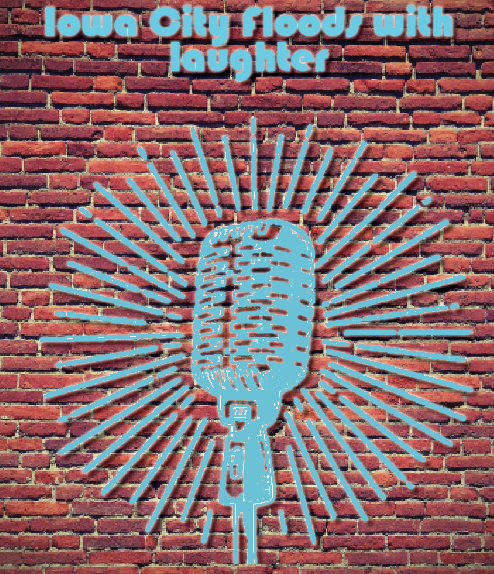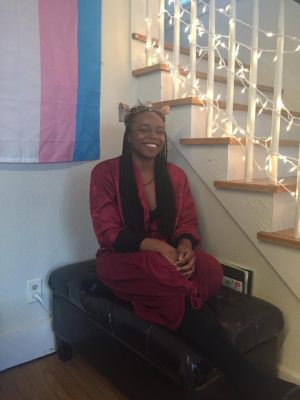Weekend of comedy to flood Iowa City
The Floodwater Comedy Festival this weekend will bring in a range of comedians. But what makes comedy funny?
February 27, 2019
A well-dressed woman stands behind a podium at the front of the stage, establishing a commanding presence over the crowd. Or maybe it is a man, casually dressed in a red blazer and jeans. The comedian leads with a joke: “So, how about that airplane food? Amirite guys?”
Is the audience obliged to laugh because the individual on stage has been deemed a comedian and put up on a platform? What makes something funny, and what does that say about society?
Comedy makes up a significant foundation of American culture. Whether some jokes are funny through agreement or laughed at because of their sheer absurdity, they can have a huge effect on what is perceived as truth and common knowledge, on what is morally correct or wrong.
UI Lecturer Megan Gogerty said one theory about comedy is that it keeps people in control by laughing at what is socially unacceptable or releasing pent-up rage.
In order to keep from plummeting into chaos, Iowa City can anticipate lots of laughter this weekend at the Floodwater Comedy Festival. The festival will bring comedians, from famous professionals to aspiring students, to Iowa City with its slogan “Love. Diversity. Laughs.”
For UI student Brigid Martin, Floodwater will provide her the opportunity to own the stage early in her standup career. She has only been doing comedy since taking Gogerty’s class last semester, but she has already taken a spot on Floodwater’s lineup. As an English and creative-writing major, she enjoys combining the writing aspect of standup with her interest in theater.
“I think writing is different for everyone. Personally, I mostly have ideas and then write them down on my phone, and then forget about them for a while until I scroll through the notes on my phone and I’m like, ‘Oh yeah, this was a thing,’” she said. “It’s mostly thinking about it and going over the ideas in your mind a lot. I like to do them in the shower. It’s a community bathroom, so people come in and hear someone talking to themselves in the shower, which is wild, but whatever. It’s a good place to rehearse, I guess.”
Martin will be featured in Last Comic Standing, which will take place this evening featuring eight comedians and also the student showcase.
“[Standup] is mostly going over ideas over and over again and making them as clear and concise as possible so that the audience is able to understand them,” Martin said. “I love that it’s a different type of art form. There are playwriting, and speech, and things, but it’s something different to get to write your own material and then perform it as well. It’s a more intimate experience with the audience, I think.”
As opposed to Martin as a novice comedian, UI junior Leela Bassuk is one of the executive producers of Floodwater and has been a part of the comedy scene since her freshman year. She has been involved the Paperback Rhino improv group and the Floodwater Festival since 2016.
“There are so many different outlets to do comedy here in Iowa City. I’ve personally chosen improv comedy and theater,” Bassuk said. “Other local comedians and students have found or created spaces to do their own kind of comedy, from standup to sketch to playwriting or screenwriting. There’s an excess of funny here.”
RELATED: The UI alums behind the Netflix original ‘Love’
She has a personal rule of not putting down certain groups in her comedy nor making jokes at the expense of others, she said. Instead, she prefers to initiate positive change through it.
“[Comedy] is a great way to comment on and critique the world around us. I believe comedy and satire have a unique ability to open people’s eyes on complex issues or situations by framing them in new or unexpected ways,” she said. “Sometimes, political humor falls flat, but definitely at times like now, when we are experiencing a tumultuous political climate, I believe that comedians play an important role in truthfully exposing, challenging, and discussing these issues and events.”
Paul Rust, a UI alum and star of Netflix original “Love” and one of the headliners for Floodwater, has a different opinion.
“[Comedy] doesn’t specifically have to be about the nuttiness that’s going on in the White House,” he said. “It can also be cathartic. It’s a feeling of not being alone in the universe, to laugh at difficult things that I’ve gone through. My favorite thing on Earth is to watch something like Airplane, which is just complete nuttiness for 90 minutes. That has value, too, to turn off your brain and laugh a lot.”
Before writing and starring in “Love”, Rust performed lots of standup comedy. He was part of a sketch group at Citizens Brigade’s theater in Los Angeles for more than 10 years.
At “An evening with Paul Rust,” he will perform a read-through of one of these sketches with two students.
“I felt a little uncomfortable coming in and being like, ‘I’m gonna do a one-man show’ — that’s just not my style or the comedy that I do,” he said. “All the comedy that I do is a group, ‘collab’ thing. It’s not in my nature to perform by myself in front of an audience, so I’m actually very happy performing with new people.”
Afterward, Rust will participate in a Q&A with the audience.
Whether a comedic piece is used in a political setting, it does play a role in our lives, and Gogerty identified what many believe to be the current purpose of comedy in American society.
RELATED: Head-driven female comedians to take Witching Hour stage
“Right now in America, the pervading theory about comedy is that comedy has become a place where you can hear the truth,” she said. “In this age of fake news and fake media, and Twitter bots, and corporate news, we always distrust our news sources. Because so many of our news sources have ulterior motives, in this environment, there’s this real hunger for ‘somebody just tell it to me straight; give me the truth.’ There is a feeling that comedy can do that.”
Alternately, some comedy might illustrate everything is fake.
“One side is like ‘give me the truth,’” Gogerty said. “The other side, though, is reacting to the fake news with a cheerful nihilism, which is nothing matters. It’s all fake, so we might as well just amuse ourselves. Comedy, historically, has always had this rebellious, impish streak.”
In addition to the “are they joking?” question, in comedy, there is this question regarding political correctness. Are people just too sensitive these days?
Again, Gogerty has an answer … sort of.
She said it is important to understand the historical context around political correctness. The term goes back to at least the 1930s in Nazi Germany. It became a right-wing talking point in the 1980s as a response to huge societal changes, such as the gay-rights movement and the second wave feminist movement.
“The incorrect political comedy movement is in the late-80s, early ’90s. It’s almost exclusively propelled by white, male grievance,” Gogerty said. “So in other words, it’s a bunch of middle-age white guys mad that they can’t say the jokes they would have made 20 years ago. That’s how it manifested.”
“Political correctness” has never been a compliment but instead, always an insult, she said.
“You’re politically correct, that means you’re cowardly,” Gogerty said. “I think it’s a dumb phrase. Anytime anyone rails against political correctness, I’m immediately suspicious of their motives. As a scholar, I find this phrase to be unhelpful. When you say political correctness, and I say political correctness, what are we talking about?”
Rust came up with a simple definition for the term.
“I get really confused when a comedian or anyone whistles against the idea of political correctness,” he said. “In my mind, that means being sensitive and mindful to others and listening to people when they say, ‘Hey, don’t say those things. Say this instead.’ There are a billion ways to be fun and still be politically correct. They are mutually inclusive. ”
Rust said he understands that comedy can be used to “fight the power,” but it is wrong to be used to target minorities.
“My taste is to be silly and bizarre, and not really take on any institutions,” he said. “Others challenge and provoke institutions and responses. There are ways to that that are not picking on already marginalized groups. There are lots of people who are small who are not worth picking on.”
It has increasingly become unacceptable in society to make jokes at the expense of minorities. Gogerty said that is important to understand if one is to interpret laughter as a form of agreement.
“A lot of times, we have a misperception about what comedy is. We think that comedy is about being confrontational, think inconvenient truths, getting in people’s faces, telling it how it is, and that’s probably not how comedy works,” she said. “Most comedy is about agreement, like, ‘Am I right, ladies?’ This is one of the reasons most comedy tends to support the status quo, because you’ve got to get broad agreement in order for your jokes to work.”






